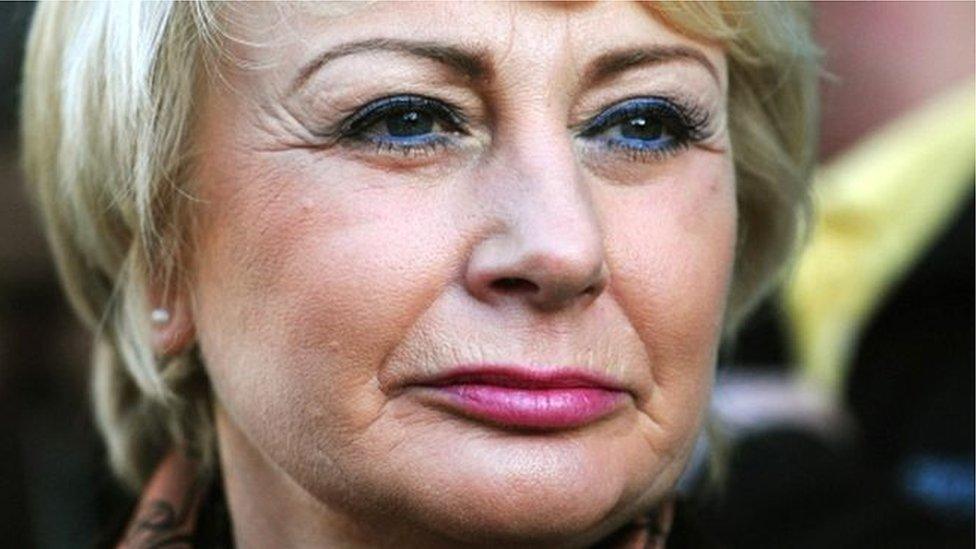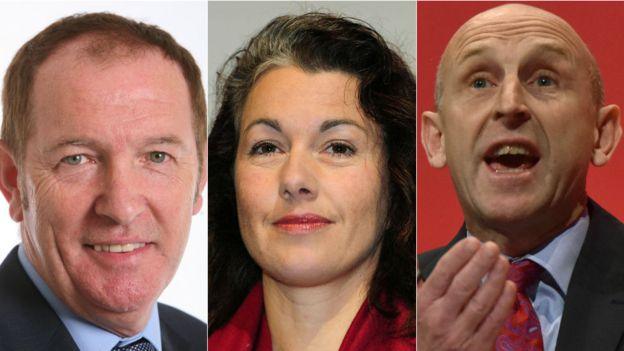UKIP MEP Jane Collins takes EU damages escape route
- Published

Jane Collins made her remarks in a speech at UKIP's national conference in 2014
The event unfolding in front of me should have been enough to send steam shooting out of the ears of any self-respecting UK Independence Party supporter.
A British judge was being stopped from awarding what were expected to be substantial damages against someone for a serious libel because of an 11th-hour claim that the rules of the European Parliament did not allow him to do so.
Except in this case, being heard on 17 May, the EU trump card was being played by Jane Collins who is a UKIP MEP for Yorkshire and the Humber.
She is claiming that as an elected Member of the European Parliament she enjoys a blanket immunity from any legal action taken against her.
It must have been the one of the most unlikely defences ever put to London's Royal Courts of Justice in the 124 years since the building was opened by Queen Victoria.
'Absurd irony'
Here was an outspoken opponent of Britain's membership of the European Union trying to escape potentially ruinous damages by appealing for help from one of the Brussels institutions she absolutely detests.
The irony was not lost on the three South Yorkshire Labour MPs she had libelled who were sitting a few metres away from her.
"The judge today was set to decide on the damages she must pay for her deeply damaging and totally baseless allegations," they said in a joint statement issued later.
"But instead the court was confronted by the absurd irony of a UKIP MEP claiming EU sovereignty and immunity as an MEP from action in the British courts."

The three Rotherham MPs - Sir Kevin Barron, Sarah Champion and John Healey - want compensation of £150,000 each
The three MPs, Sarah Champion, John Healey and Sir Kevin Barron, whose neighbouring constituencies cover Rotherham, had been accused by Jane Collins of "knowing all about" the scandal of 1,400 cases of grooming and rape of young girls in the town and doing nothing to intervene.
The allegations were made in a speech Jane Collins made at the UKIP conference held at Doncaster Racecourse in September 2014 and broadcast live on the BBC Parliament Channel.
At the time Ms Collins had been selected as the candidate to stand against Sarah Champion in her Rotherham seat at the upcoming General Election.
At a previous hearing in 2015 the High Court threw out the UKIP legal team's defence that the speech should be treated as routine political comment and ruled her intention had clearly been libellous.
It had taken a year to get Jane Collins back in court for the Judge, Mr Justice Welby, to assess the level of costs and damages.
'Improbable' defence
The judge said he thought it "improbable" immunity from paying up would be granted but he suspended proceedings until the European Parliament had had an opportunity to investigate her application.
Legal immunity for MEPs has existed under European law since 1965 but in very limited circumstances.
It is similar to the "parliamentary privilege" enjoyed by UK MPs who are free to make any comments they want in speeches made in the House of Commons with no fear of legal action being taken against them.
What UK MPs say outside the chamber has no legal protection at all.
A committee of MEPs in Brussels are now expected to take several months to decide whether the European version of "parliamentary privilege" can be stretched to cover a speech made at a party political conference by someone who was bidding to beat one of those she libelled at the next General Election.
An unrepentant Jane Collins issued a defiant statement claiming the libelled Labour MPs had only themselves to blame for the latest turn of events.
She pointed out that the Labour Party supports remaining in the European Union which means keeping all existing EU laws and regulations, including the one which gives her the chance of an escape route from paying damages.
"It seems bizarre that they are so keen for UK law to be supreme when it suits them but not when it suits the country," her statement concluded.